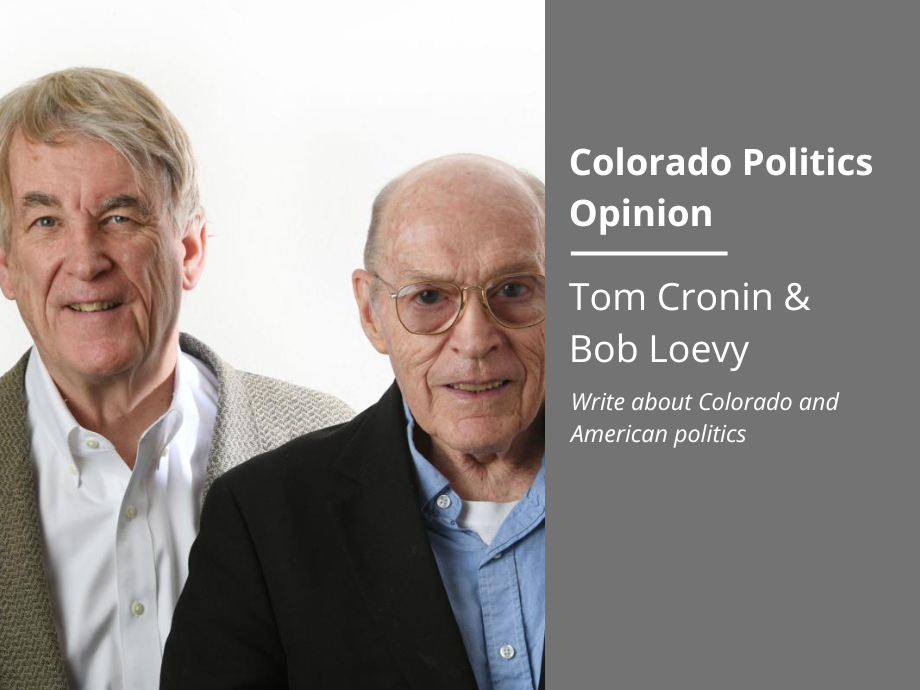Suthers autobiography a fascinating story in self-actualization | CRONIN & LOEVY


Colorado Springs attorney John Suthers has been the most successful and effective Republican public servant in Colorado dating back to the mid-1980s.
He served as the elected District Attorney for El Paso and Teller counties for eight years from 1988 through 1996. He served as the executive director of the Colorado Department of Corrections for nearly three years beginning in 1999. He was appointed by President George W. Bush and confirmed by the U.S. Senate to serve as U.S. attorney for Colorado, and he did that for more than three years beginning in 2001.
He ran and lost a statewide election for Colorado attorney general in 1998 but was appointed to that position a few years later. He subsequently won election in 2006 and 2010 to serve as Colorado’s attorney general in his own right.
Then in 2015 and 2019 he won election and reelection as mayor of Colorado Springs, the second most populous city in Colorado.
He had a remarkable public service career. As a college student, he had dedicated himself “to lead a life with meaning and purpose.” He definitely has done this.
This autobiography is an uncommonly personal, candid and compelling case study of a life devoted to the rule of law and public service. He said his hero was Saint Thomas More. “He was a lawyer, a politician, and a saint. The fact that is possible gave me hope.”
Stay up to speed: Sign-up for daily opinion in your inbox Monday-Friday
The John Suthers story has a lot in common with the fictional heroes in Horatio Alger novels. He was born out of wedlock, orphaned, and adopted by unusually caring adoptive parents. He then was raised in a devout traditional Catholic family, worked hard, studied hard and successfully competed in sports.
Unexpected patrons and benefactors provided him with a full scholarship to college. He was a striver and, to use his words, a “straight arrow,” He sought success and dedicated his professional career to giving back to his community, his state and his country.
The book makes clear John Suthers was proud of his strict Catholic education. He was proud of serving as an altar boy. He thrived at Saint Mary’s Catholic high school in Colorado Springs, where he excelled as a student, athlete and the student body president.
Suthers remembers all his elementary school teachers. He recalls mowing lawns in the affluent Broadmoor neighborhood for $3 an hour. There was a high school basketball game where he scored 36 points. There was a local high school all-star baseball game where he got a hit off a Wasson High School pitcher named Goose Gossage, who later went on to be a legendary pitching star for the New York Yankees. The hit was only a foul ball, yet it was a hit – sort of.
John Suthers has been a lifelong traditional economic conservative. He was influenced by his conservative government professors at Notre Dame University in South Bend, Indiana. He loved his demanding constitutional law course. He wrote, “A conservative is…skeptical about government’s ability to solve problems other than those inherent to its charter, such as public safety.” He was less keen about the many liberal law professors he had at Colorado University Law School in Boulder.
Suthers may have been a principled conservative, yet he has handled his professional responsibilities in a nonpartisan way. He has won the admiration of many Democrats and independents. He won reelection as mayor of Colorado Springs in 2019 with 73% of the vote, which is illustrative of his appeal to a broad spectrum of voters.
He admires conservative newspaper columnist George Will. He worked hard to elect moderate Republican Mitt Romney president in 2012. He makes clear he was a Romney rather than a Trump Republican. Suthers writes that the fact that Romney “couldn’t get elected and Trump could get elected strikes me as the ultimate confirmation that in politics the best man does not always win.”
The most consistent theme in Suthers’s memoir is the celebration of his role of serving as prosecutor in the courtroom. He loved his work as a deputy district attorney and later as district attorney for the Colorado Springs region. He believes being a prosecutor is one of the highest callings. He has a strong belief in the jury system yet has doubts about the motives of some judges. He shares in considerable detail a great number of the cases he was involved in at the local, state and U.S. government levels.
Suthers writes prosecutors often have to tackle controversial issues and make tough decisions that sometimes lose them friends. “In my time as district attorney, my office sent two (campaign) contributors to prison, prosecuted several others that I knew for drunk driving and other indiscretions, and prosecuted the children of many prominent citizens as juvenile delinquents.”
He resigned his membership in an elite local dining club in downtown Colorado Springs because an older member suggested he should “go easy” on a fellow club member. Several years later, he resigned his membership in the exclusive Cheyenne Mountain Country Club in Broadmoor because of its discriminatory membership practices.
Over the course of his long political career, Suthers recalls being attacked by a German shepherd dog while campaigning for district attorney. When elected to office, he received many death threats and often had to wear a bulletproof vest for several months. He earned the enmity of hundreds of convicted criminals he sent to state prisons. One time he was spat on, and he once needed a police escort to escape a controversial public forum at the University of Denver. Public service, he makes clear, is not for the weak at heart.
While serving as attorney general of Colorado, Suthers worked on some famous cases. One was Lobato v. Colorado, where rural counties sued the state for more money for public schools because the state Constitution required a “thorough and uniform” state public school system. The problem was voters had amended the state Constitution to require state taxes be raised only by a vote of the citizenry. It was known as the TABOR Amendment. Even if the courts ordered more money for public schools, there was no guarantee the voters would vote in favor of the required taxes. The Colorado Supreme Court ruled the existing system of public-school finance was “thorough and uniform,” a major court victory for Suthers.
Another interesting case involved the author and main supporter of The TABOR Amendment – Douglas Bruce of Colorado Springs. A perpetual critic of government, Bruce failed to pay his taxes and file the appropriate tax forms. Suthers prosecuted Bruce for his tax crimes, and Bruce was convicted by a jury and served time in prison. There were repercussions to the case, however. When Suthers ran for mayor of Colorado Springs a few years later, Bruce organized his many supporters to oppose Suthers’s election.
Suthers notes his favorite job was serving in the statewide office of Colorado Attorney General. He argues it is essentially the largest law firm in the state. When he left it employed 450 staff, of which 275 were lawyers. He writes the most challenging job he had, yet the one that gave him the most satisfaction, was serving as mayor of Colorado Springs.
He is proud of attracting 50,000 new jobs to Colorado Springs while serving as mayor. He enriched tourism and expanded services at Colorado Springs Airport. And, as we recently learned, he and his colleagues fought successfully to overturn Trump’s political decision to move the U.S. Space Command from Colorado Springs to Alabama. He shared the complications and challenges of leading his city through the coronavirus pandemic.
As a newly elected mayor, John Suthers took charge of a city with a $1.5 billion infrastructure deficit. He noted “60% of the city streets were in poor condition.” Colorado Springs voters had a reputation for being strongly anti-tax, but Suthers forged ahead and asked the voters to approve a $50 million tax increase to support road and gutter repairs. The tax increase was approved by a vote of 65% to 35%.
Suthers believes many of society’s policy problems are best solved at the local level. He argues we too often turn to the U.S. federal government for answers or financing projects. He concludes local government and private organizations might be better equipped to handle most problems.
Ironically, despite the often-stated preference for local and state government, Colorado Springs is increasingly dependent on U.S. government military installations and other U.S. government subsidies.
But John Suthers can be justifiably proud that Colorado Springs, during his eight-year stint as mayor, regularly won national recognition as one of America’s best cities to live in, to retire in and to visit as a tourist.
Suthers credits his wife Janet for much of his success. She had been a Democrat, yet she became an invaluable partner, advisor and campaigner for her huband.
That John Suthers loves Colorado Springs and his friends and colleagues here is abundantly clear in this highly readable and compelling autobiography. His friends will love this book. Others should read it to understand Colorado politics and government and especially the job and rewards of serving as a prosecutor. Highly recommended!
Tom Cronin and Bob Loevy write regularly about Colorado and national politics and are co-authors of the book “Colorado Politics and Policy.”












